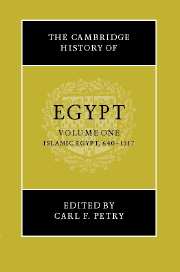Book contents
- Frontmatter
- 1 Egypt under Roman rule: the legacy of ancient Egypt
- 2 Egypt on the eve of the Muslim conquest
- 3 Egypt as a province in the Islamic caliphate, 641–868
- 4 Autonomous Egypt from Ibn Tūlūn to Kāfūr, 868–969
- 5 The Ismā‘īlī Da‘wa and the Fātimid caliphate
- 6 The Fātimid state, 969–1171
- 7 The non-Muslim communities: Christian communities
- 8 The non-Muslim communities: the Jewish community
- 9 The crusader era and the Ayyūbid dynasty
- 10 The Bahrī Mamlūk sultanate, 1250–1390
- 11 The regime of the Circassian Mamlūks
- 12 The monetary history of Egypt, 642–1517
- 13 Art and architecture in the medieval period
- 14 Culture and society during the late Middle Ages
- 15 Historiography of the Ayyūbid and Mamlūk epochs
- 16 Egypt in the world system of the later Middle Ages
- 17 The military institution and innovation in the late Mamlūk period
- 18 The Ottoman occupation
- The Rulers of Egypt, 254–922/868–1517
- Glossary
- Bibliography
- Index
- References
17 - The military institution and innovation in the late Mamlūk period
Published online by Cambridge University Press: 28 March 2008
- Frontmatter
- 1 Egypt under Roman rule: the legacy of ancient Egypt
- 2 Egypt on the eve of the Muslim conquest
- 3 Egypt as a province in the Islamic caliphate, 641–868
- 4 Autonomous Egypt from Ibn Tūlūn to Kāfūr, 868–969
- 5 The Ismā‘īlī Da‘wa and the Fātimid caliphate
- 6 The Fātimid state, 969–1171
- 7 The non-Muslim communities: Christian communities
- 8 The non-Muslim communities: the Jewish community
- 9 The crusader era and the Ayyūbid dynasty
- 10 The Bahrī Mamlūk sultanate, 1250–1390
- 11 The regime of the Circassian Mamlūks
- 12 The monetary history of Egypt, 642–1517
- 13 Art and architecture in the medieval period
- 14 Culture and society during the late Middle Ages
- 15 Historiography of the Ayyūbid and Mamlūk epochs
- 16 Egypt in the world system of the later Middle Ages
- 17 The military institution and innovation in the late Mamlūk period
- 18 The Ottoman occupation
- The Rulers of Egypt, 254–922/868–1517
- Glossary
- Bibliography
- Index
- References
Summary
Upon the accession of Qānsūh al-Ghawrī to the Cairo sultanate in 906/1501, the Mamlūk oligarchy over which he presided had ruled Egypt and Syria as a unified imperium for more than 250 years. While no institution of such longevity could remain immune to evolutionary change, the Mamlūk regime was remarkable for its stability in a turbulent international milieu. This stability was sustained in large part because of the Mamlūks’ commitment to a static concept of imperialism and their allegiance to conservative values of caste hegemony. To be sure, the Mamlūk oligarchy, during its final decades of sovereignty, exhibited behavioral characteristics that contemporary observers found ominous both for the preservation of the realm’s security and ensuring its fiscal solvency. And yet these characteristics were the predictable manifestations of tendencies – positive and negative – in existence since the military elite’s inception under the late Ayyūbids.
The last effective Ayyūbid monarch in Cairo, al–Sālih Najm al–Dīn, regarded the mamlūk slave–soldiers of his predecessor as a threat, fearing that their loyalty might devolve upon his Syrian rivals. He sought to defend his position by founding a new corps of troops whose officers set up the Mamlūk regime upon his death. They initially regarded their function as custodial, aimed at protecting their own status from Ayyūbid claimants. Rudimentary as their ideas were about statecraft at this early stage, these founders appreciated their vulnerability as usurpers. Installed as bodyguards of a paranoid ruler, they rightly saw their prospects as tenuous if a successor who resented the privileges their patron had granted them took power.
- Type
- Chapter
- Information
- The Cambridge History of Egypt , pp. 462 - 489Publisher: Cambridge University PressPrint publication year: 1998
References
- 3
- Cited by

